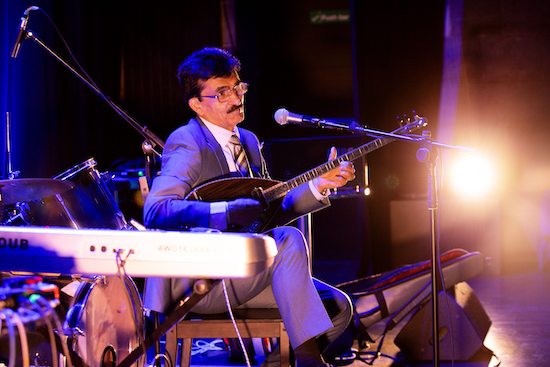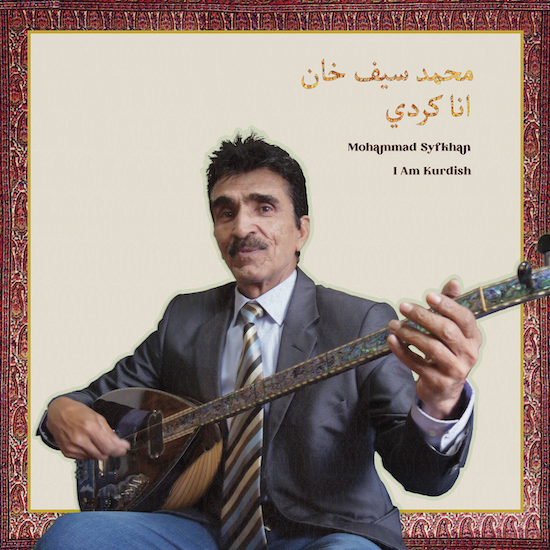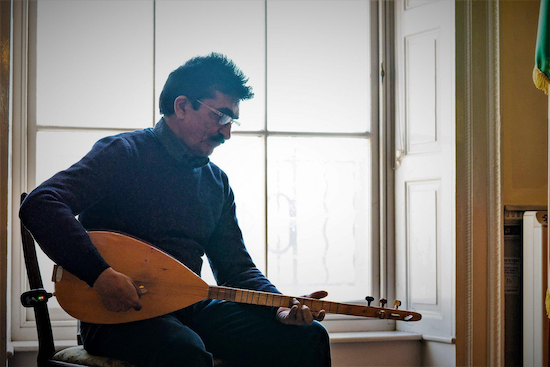Mohammad Syfkhan portrait by Caroline Minshall
It’s likely that every person who has stood in a DJ booth has, at one time or another, had their endeavours interrupted by a punter asking if they can choose the next song or "get on the mic" to wish their pal a happy birthday. At the time of writing however, no statistics are available concerning what percentage of DJ sets are interrupted by someone looking to play Kurdish folk music on the bouzouki.
In 2018 Irish film maker and ex-Woven Skull musician Willie Stewart was playing records to a family crowd at a community centre when Mohammad Syfkhan appeared before him carrying the distinctive long-necked instrument with the teardrop-shaped body and asked simply: "Where do I plug in?"
Stewart, an affable longhair who lives in rural Leitrim, says: "In the local town to me, Carrick-on-Shannon, there’s an international community group that organises events for people attending to highlight their cultures with music, food and dancing.
"On this particular day there was an amazing atmosphere but nobody had told me there was going to be live music so all I had was the DJ mixer. When this guy walked up unexpectedly and asked if he could play, it was a case of, ‘Whatever, we’ll work it out.’
"So he plugged directly into the mixer and just went for it, and of course everyone started dancing. There were kids originally from the Middle East going crazy. So I was like, ‘Who is this guy? Where did he come from? Where does he live? What’s his story?’"
Mohammad Syfkhan has lived with his wife and daughter in the Republic Of Ireland since 2016, but his story began some 50 years earlier in Syria. He was born in the town of Ras al-Ayn, in the north of the country near the Turkish border, before his family relocated to Raqqa. He has happy memories of his youth in the city: "[In Raqqa] Spring is one of the beautiful seasons of the year in which flowers bloom and a new cycle of life begins, and it is the time when the Kurds celebrate Nowruz [new year]."
He began learning the bouzouki in 1981 while studying to become a nurse at the university surgical hospital in Aleppo. After gaining a degree in 1983 he moved back to Raqqa to work and raise a family, but also to pursue his other passion: playing live music. He founded the Al-Rabie Band featuring him as singer and bouzouki player. They became much sought after to play wedding parties, festivals and concerts, drawing their repertoire from a wide variety of sources, including some Western numbers and some of his own compositions.
He explains: "In Syria I used to sing many songs; some I wrote, some were written by others, and some were traditional songs from our heritage. I played a lot of Turkish music. I love the Greek singer Demis Roussos, and all kinds of Western music. The first Al-Rabie Band album was released in 1986. My day job was as a surgical nurse, and the parties we played were after my work shifts in the hospital ended."
He indicates that even back in the 1980s, the idea of playing Western secular music in Syria, was challenging territory to navigate: "The rise of groups [such as the Al-Rabie Band] was considered disgusting by some because it was thought that the music did not distinguish right from wrong and good from bad."
In 2011 a civil war slowly toppled Syria into a dismayingly violent chaos that it is still struggling to recover from. In 2013 Raqqa was captured in quick succession by the Bashar al-Assad-opposing rebels of the Syrian National Coalition and then by the militant jihadist group ISIS. The fall of territories to Islamic State impacted on Mohammad and his family – devout, peace-loving Muslims – in a way that most reading this feature will struggle to fully comprehend.
He says: "My son F was martyred on 21 September 2014 in Kobani [a Kurdish-majority city in Aleppo, harrowed and partially destroyed during four months of ISIS control]. His death was devastating to me and my family. Immediately after ISIS killed my son, they found my number on his phone, called me [and told me], ‘We cut off his head and we were playing football with his body.’"
He fled with his family a few months later: "We escaped inevitable death in Syria. We took the road of death, travelling across the sea on rubber boats. They were tough days but thanks to the Lord we reached Greece and stayed there for ten months."
At the end of 2015 his three remaining sons travelled on to resettle in Germany while he, his wife and young daughter ended up in Ireland. Like many families arriving in the Republic, fleeing the brutality of the Syrian Civil War, they were housed, initially, in the incongruous location of a holiday camp.
Willie Stewart takes up the story: "At the moment in Ireland there’s a policy for the rehousing of people coming to this country fleeing a war zone called direct provision and it’s horrible. People who own guesthouses make a lot of money off the government by taking in refugees. As an idea, it probably looked good on paper but I don’t think they’re treated very well. Mohammad arrived relatively early on in the conflict and he was brought to a place called Mosney, which is basically like a Pontins, 30 miles north of Dublin in County Meath. I actually went there as a kid weirdly enough."
One of the first people that Mohammad met on arriving at the Mosney camp was none other than Lankum’s fiddle player Cormac MacDiarmada. Speaking via email he tells me: "We were asked to play some tunes at Mosney on Christmas Eve, 2015. I think Mohammad had only been there for about eight days, a few people sang some songs and he asked if he could fetch his bouzouki and we said, ‘Of course!’ Naturally.
"When he played, we were all totally stunned, he was unreal! I’ve seen him play a couple of times since and each time I’ve been absolutely entranced. He has a beautiful, melodic, driving style that weaves in and out. He’d switch between melody and verse for ages, never missing a beat. For me, this scratched a musical itch I didn’t even know that I had; but there’s a similar satisfaction that I get from American old-time music. After watching him play live I would have a trance-inducing back beat rolling around my head for days afterwards. Even as I type this it’s drifting back in from my memory!" (Syfkhan would end up playing with Lankum again in 2023, this time supporting them at Cork Opera House, winning over 1,000 new fans in the process.)

Mohammad Syfkhan live at The Dock, by Brian Farrell
In relative terms Mohammad’s immediate family in Ireland were lucky as they ended up getting a council house in Carrick-on-Shannon, giving them a feeling of safety and comfort they hadn’t experienced for some time. He began throwing himself into the Irish underground and diasporic music scenes, playing festivals in both Sligo and Dublin as well as many shows and community events such as weddings in Ireland and Germany, espousing a personal philosophy that music itself is a language which transcends any other communication difficulties which may exist between people.
In 2022 Willie Stewart founded Nyahh Records to support fellow travellers in the Irish underground, and the label has already been responsible for essential releases by One Leg One Eye (a new solo venture from Ian Lynch of Lankum); recent primer Under The Island (A Compilation Of Experimental Music In Ireland 1960 – 1994); and the physical release of one of tQ’s favourite albums of 2021, Whose Woods Are These by Eimear Reidy & Natalia Beylis.
But the intention for the label was always to face out as well as in. Stewart was very excited to get the chance to release the American noise album Strip Ice Water To Listerine by Robert Turman and the now sadly departed sound artist Tom Smith early last year. With this in mind, and given their growing friendship, it seemed obvious to him he should put out Syfkhan’s debut album in the West. The first session was recorded in Leitrim with Eimear Reidy on cello and Cathal Roche on saxophone, the second, which featured just Syfkhan, took place in a different studio in Wicklow the following year and the resulting long player I Am Kurdish, is one of the finest of the year so far.
Despite having a background as a wedding musician from Syria, none of the songs on the album are recognisably in the traditional dabke style; rather he has cast a much wider and deeper stylistic net taking in forms from right across the Middle East, Mediterranean Europe and North Africa: "I play and sing many Egyptian, Iraqi, Gulf, Yemeni, Moroccan, Algerian, Jordanian, and Palestinian songs, in addition to Kurdish and Turkish songs. This is the mix of music that came with me from my country." One of several highlights though is Syfkhan’s own composition which gives the album its title. He says: "This song possesses sadness with hope. I wrote the words to ‘Az Kardam’ [I Am Kurdish] out of the tragedy I lived through and I gave it a suitable melody. Whenever I sing it, I am saying to anyone listening: ‘This is our life, and we thank the Lord.’"
In global terms, probably the most famous tune here is Baligh Hamdi’s ‘A Thousand And One Nights’ – a staple of one thousand and one kitsch LPs featuring a belly dancer on the cover and, more importantly, the basis of an incredible concert recording of the Nightingale Of The Nile Umm Kalthum, which became a pan-Arabic hit after it was released by Sono Cairo in 1969. At the other end of the scale, party banger ‘Put Coffee In The Glass’ is likely not known to many in the West outside of the Kurdish diaspora, the name of its composer long since lost to time; more contemporary is ‘I Adore Those Eyes’ written by fellow Kurd and citizen of Ras al-Ayn, Mihemed Elî Şakir. Elsewhere the traditional song ‘Don’t Bow Down’ "means that love is the highest state of communication, so you should not be ashamed because you are in love… You love and you should be proud!"

Nyahh boss Willie Stewart is at pains to point out to me during a long conversation after the interview that he doesn’t want the tragic aspect of Mohammad’s story to be used as some crass marketing tool, but at the same time he admits that the musician wants his story to be told and really wants his music to be heard. On top of this he also acknowledges the fact that the record comes out during a time of intense political flux in Ireland.
Addressing the dynamic way in which immigration has changed during his lifetime he talks of Ireland being historically "a little postcolonial island next to England" trying to shake off a 20th century conservative "cesspool" mindset created by the dominant church regime and the policies of politicians such as Éamon de Valera; but also in more recent decades how it has become a modern, liberal country dealing well with immigration from Poland, Latvia, the former Czech Republic, Nigeria, Brazil and, more recently, Ukraine.
He says: "There was an influx of people coming in and everything seemed cool and calm; everything was getting integrated. But then, because of Covid, all of a sudden, there’s the rise of the fucking far-right in Ireland, and nationalism and fascism."
He is referring to the dispiriting and out-of-character riots in Dublin City during November last year: "A North African guy having a severe mental health breakdown, stabbed kids outside a primary school. The far right jumped on this but their form of protest was to destroy things: to loot shops and set a bus on fire, which was really confusing because they’re supposed to love this country. The only great thing to come out of it is that no one can take them seriously now because it’s clear they’re just thugs. I don’t think people are scared for their lives but everything feels more unsettled than it did before."
But the attitude and message and music of Mohammad Syfkhan is about as good a rejoinder to the faltering rise of neo-fascism in Ireland as one could imagine. Possessing a civic pride and heartfelt appreciation for the people and the government of the country he now calls home, that makes a mockery of all extremist violence against people and property, he tells me: "Living in Ireland is wonderful, not because Ireland is beautiful, but because it has beautiful people who love and sanctify life. This love they have for life, they want to share with other people.
"In the future I will try to make albums which collect songs that are as beautiful as the Springtime. I will try and play Kurdish and Irish music together, with the participation of the wonderful musicians of Ireland."
Mohammad Syfkhan was interviewed by email with the assistance of a translator
I Am Kurdish is released on LP/CD/digital/streaming by Nyahh on 14 February



